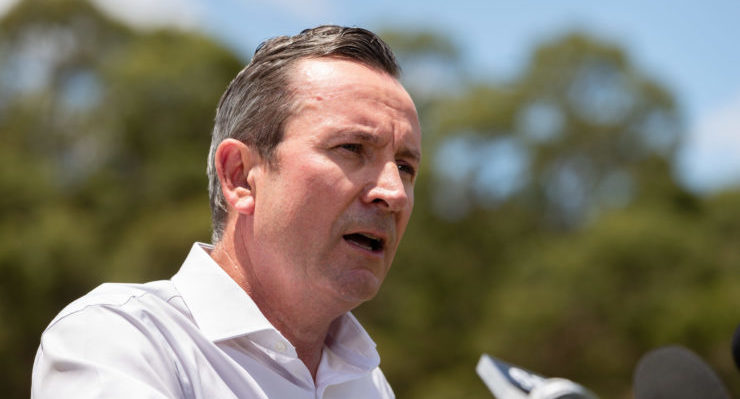
It’s been tried before, but the McGowan government’s whopping majority in both houses of Parliament has enabled it to legislate for a single statewide electorate in the Legislative Council.
After more than 100 years, Labor succeeded last week in eradicating the notorious malapportionment of votes in the upper house.
The legislation resulted from a ministerial expert committee appointed in April this year headed by former governor and eminent jurist Malcolm McCusker.
The committee’s key recommendation was that the six upper house geographical regions with six members for each region be replaced by a single statewide electorate.
Previously, geographical location determined that some votes in the upper house were worth many times more than others, with the malapportionment traditionally favouring the Liberal and National Parties.
While the single statewide electorate is the major plank of the legislation, group voting tickets or preference harvesting has also been abolished.
This means that a candidate like the Daylight Saving Party’s Wilson Tucker would no longer be electable. Preference harvesting enabled Tucker to be elected in this year’s state ballot despite winning only 98 first-preference votes.
Apart from Tucker, the Nationals have been the principal beneficiaries of the previous weighted system, so it was no surprise that Nationals and Opposition Leader Mia Davies has lashed out at the new legislation.
“This is a dark day for regional WA,” Davies said.
“Their voices have been silenced, they have been refused a seat at the decision-making table, and their representation has been killed off.”
The new protocol might also pose a challenge to the influence of members of the Liberal Party’s infamous “The Clan”, who have been a dominant force in the upper house, preselection of candidates and party branch stacking.
The highest profile member of The Clan is former finance minister Mathias Cormann, now secretary-general of the OECD, but the most prominent Clan members of the upper house are Peter Collier and Nick Goiran, the latter of whom has achieved notoriety for his drawn-out blocking of government legislation.
The Clan has been outed within the Liberal Party as an obstacle to the reform it sorely needs if it is to regain credibility with the electorate after coming close to annihilation at this year’s election.
But the Greens aren’t whingeing. Former Fremantle mayor Brad Pettitt is the only Greens member in the WA Parliament, and he endorsed the legislation.
Pettitt told Crikey that the legislation would ensure a “fair, one vote, one value outcome and less of a random lottery for the last upper house seats”.
“For the Greens, it will mean at least three or four spots following the next election rather than the one we currently have,” he said.
But given WA is a vast land mass, Pettitt said this momentous legislation needed to be followed up by encouraging a reasonable percentage of members in the upper house to live and have their electoral offices in the regions.








Hurrah! At last.
“Nationals and Opposition Leader Mia Davies has lashed out at the new legislation.“This is a dark day for regional WA,” Davies said. “Their voices have been silenced, they have been refused a seat at the decision-making table, and their representation has been killed off.”
Sheesh, even by Liberal / National Party standards that’s an impressive set of lies. All that’s happened is their voices will be proportional to their electoral support, they will have all the seats at the decision-making table they merit, and their representation will reflect the votes they get. What is so terrible about that?
The WA Liberals and Nationals have for decades been moaning about the dreadful lack of everything in rural WA. They should reflect on how that is so when rural WA has enjoyed such an excess of representation during all those years. If extra representation is so good for rural WA why can’t we see it? My guess is that most of the rural population of WA will be better off once the Liberals and Nationals can no longer provide a bespoke service for the very wealthy minority they truly represent.
Bridget McKenzie should take note as well. Ms McK and other Nats have commented (more than once) about how ‘poor and disadvantaged’ the people in their electorates are. Why is this so? Can Bridget and her mates get of their backsides and do something about this terrible situation… before the voters finally wake up and vote for someone else.
‘off’ not of!
Daniel Andrews needs to take a lesson from McGowan and abolish Group Voting Tickets. Without GVTs, the “unrepresentative swill” (one of Keating’s best lines) of the upper house would not be there to give him his headache over the “Pandemic Bill”. It is overwhelmingly likely that a more Labor-sympathetic upper house would have been elected, enough to make even Somyurek’s vindictive intervention irrelevant. Victoria is now the only jurisdiction with GVTs. The main victim of GVTs has been the Greens and it’s hard to believe that this hasn’t been a factor in Andrews’ indifference. Bad call, Dan, chickens came home to roost.
It’s a shame that McGowan didn’t go further, ditch the Legislative Council, and adopt NZ style MMP. This would give regional WA a voice in the same chamber as the minor parties.
Perhaps, but it’s remarkable and praiseworthy that he went this far, and it does enact the full recommendation of the expert committee. Far too often a large majority like this is squandered by a timid or over-cautious leader failing to seize once-in-a-lifetime chances.
“the Daylight Saving Party’s Wilson Tucker would no longer be electable. Preference harvesting enabled Tucker to be elected in this year’s state ballot despite winning only 98 first-preference votes.”
It should be noted that Tucker, to his great credit, voted for these reforms that remove the route he took to enter parliament.
Further, it is unlikely that Wilson Tucker would be elected, but he might still be electable.
The GVT, like Keating’s iniquitous 1984 Line in Senate ballots was, as Antony Green testified at the risible 30 minute Senate Estimates’ committee, an attempt by Machine minders of the right to corral voters who might otherwise be inclined to vote more widely.
I am a reluctant convert to MME, failing D’Hondt but I have yet to see it work for a large electorate.
(My lived experience is of the German ‘double vote’/party ticket which would have given PJK wet dreams.)